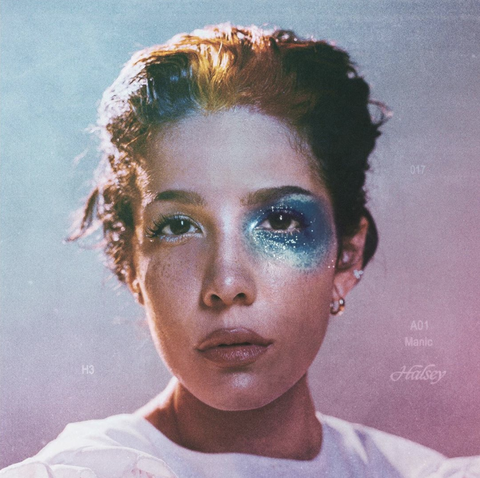Written by Sierra Walsh
From her powerful poem “A Story Like Mine” to her Halloween parties that raise money for homeless LGBTQA+ youth in LA, Halsey has advocated for mental health, women’s and LGBTQA+ rights since the beginning of her career. Through her music, Halsey has opened up about her bipolar disorder and has worked to become a voice for people that can relate to her past and present struggles. For instance, her 2018 single “Without Me” is not only her first Billboard Hot 100 single, it is a number one hit that details a toxic relationship that many have experienced. Her 2019 single “Nightmare” rapidly became another iconic, empowering anthem embracing sexual freedom and self-acceptance that earned it the seventeenth spot on Billboard’s Best Songs of 2019. Just those two singles alone were enough to hype fans for her third album, Manic, released on January 17th, 2020.
Overall, the album is a deep dive into what Halsey calls, “an album by Ashley for Halsey.” Starting with the song “Ashley,” Manic begins with a reflections of how she doesn’t “want to be someone in America/Just fighting the hysteria”, displaying the inner battle of wanting to change society but simultaneously carrying the guilt from her mistakes. By ending the song with Kate Winslet’s famous line, “I’m just a f*cked up girl searching for her own peace of mind. Don’t assign me yours” the album’s title takes on a double meaning. Manic not only alludes to mental illness and working to overcome it, but the Manic Pixie Dream Girl archetype found in many romance novels and movies.
To fans of the movie Eternal Sunshine of the Spotless Mind, the Manic Pixie Dream Girl metaphor might have been obvious. Winslet’s character, Clementine, is first perceived as an MPD but her complexities are explored through flashbacks of her relationship to Jim Carrey’s character, Joel. Clementine flips the Manic Pixie Dream Girl cliché on its head by refusing to be another “concept” to a man that depends on her to “fix” him with her wild spirit. Halsey’s homage to this character not only pays respects to Clementine and what she represents but shows another woman that relates to “I don’t need anyone/I just need everyone and then some.” “Clementine” mirrors “Ashley” and how Halsey fights the want to be independent, not needing anyone, but still craving human connection and validation. The first two tracks set up the album’s duality–which is visually displayed in the “Beautiful Stranger//Finally” video–between how an audience sees an artist verses how they see themselves and who they actually are.
Just like Eternal Sunshine, Manic begins with first impressions of a wildly independent artist with bright hair and a dazzling smile before revealing the emotional scars left behind from a toxic relationship. There has been plenty of speculation about who Halsey has written “Graveyard” and “You Should Be Sad” about, but the point isn’t who the subject of the song is or how much her fans want to fight them. Both songs embody escaping an abusive relationship, “Graveyard” oriented around how the relationship seemed like the best kind of insanity, as symbolized by the empty carnival in the music video and “You Should be Sad” being her retrospective thoughts about the man after the relationship ends. Following the duality motif, “You Should Be Sad” ends with her showing her strength through alluding to her role models (Lady Gaga, Shania Twain, and, Christina Aguilera) and standing on her own. “Graveyard” details how Halsey “would’ve followed all the way to the graveyard,” and continuously put herself in compromising situations in order to be with the one she loves.
Powerful lyrics such as “the warning signs can feel like butterflies” can serve as a warning to be more self-aware in a relationship. While Halsey never outright says that the relationship is abusive, visuals such as the purple ring around her eye for the album cover and “Graveyard” (from the lyrics to the video) drop hints that the man she is singing to in “You Should Be Sad” was a little more than the typical incompatible partner. This is pure speculation, but the lyrics “I made it out/without breakin down/then ran so fu*kin far/so you could never ever touch me again” sound like a situation that nearly 3 in 10 American women experience according to thehotline.org. Another statistic from the website adds that 1 in 4 women ages 18 and older have been victims of Intimate Partner Violence (IPV) and, overall, IPV has affected 12 million people annually. While “You Should Be Sad” isn’t the first song to portray an escape from an abusive partner, it keeps the conversation at a forefront. With Halsey being in the same age group that is most affected by IPV (ages 18-24 and 25-34), it is safe to say that she is able to help inspire young people get out of the same, harmful situation she was in.
Another prominent issue is brought to the conversation with the track “More”. Halsey sings about how the odds of her having a child are stacked against her, yet “nothing could stop me from giving a try.” In the past, she has been open about her battle with endometriosis which affects 1 in 10 women in America. This condition has no cure and has symptoms such as difficult and painful menstruation cycles and difficulty conceiving children. Just as “You Should Be Sad” holds an empowering undertone of becoming stronger than the trauma, “More” explores the tragedy of miscarriage, yet holds onto hope that one day, “when you decide it’s your time to arrive” that she will be able to give all of her love to her child.
As most semi-autobiographical records do, Manic continues to deliver tracks about self-reflection, healing, and, moving on. The three interludes highlight Halsey’s value in showcasing talent from icons and friends while remaining true to her messages. “Dominic’s Interlude” gives a unique take on how an outsider views a person in a toxic relationship, urging them to “take a chance, come take my hand” as a way to help them escape. Of course her collaboration with Alanis Morissette is nothing short of iconic, keeping true to Halsey’s value of fighting the taboos against bisexuality and sexual fluidity. SUGA’s interlude includes the original Korean lyrics in the Visualizer, which shows how high of a respect for individuality and culture Halsey keeps in her art.
After everything she has been through, Halsey ends the record with “929” which mirrors the remaining teachable and self-love themes from “Still Learning” but also asks “count out loud, so we know you don’t keep ’em for yourself.” Understanding that helping people starts with helping oneself feels like a common thread between the two songs, and the album brings itself full circle. Overall, it is a masterfully crafted record that once again proves that no matter the circumstances, our crowned Queen of Chaos will always find a way for herself and her people to be heard.

View Halsey’s upcoming tour dates, and purchase\stream Manic HERE.



